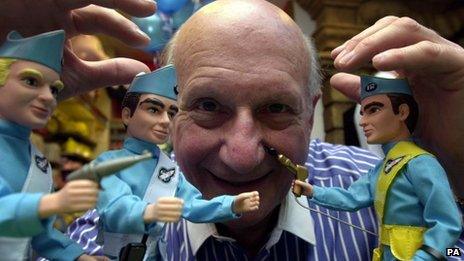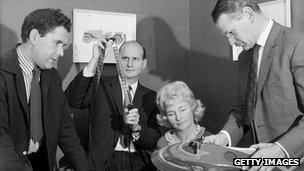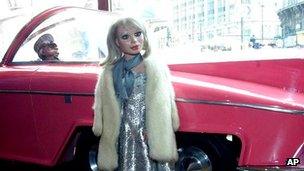Gerry Anderson: Obituary
- Published

Gerry Anderson found that his classic creations were in constant demand
TV producer Gerry Anderson, who has died at the age of 83, made his name with classic shows like Thunderbirds - despite saying he never liked working with puppets.
After starting his career at the Colonial Film Unit, part of the Ministry of Information, Anderson set up a TV and film production company, AP Films.
But work was hard to come by, and when he was approached to make a puppet show called The Adventures Of Twizzle in 1957, he had little option but to accept.
"I was shattered when I learnt the programmes had to be made with puppets as I'd illusions of making great pictures like Ben Hur," he later said.
"But there we were with no money, and an offer on the table. We had to take it."
Another puppet series, Torchy The Battery Boy, followed, and the positive reaction to his wooden creations and relative failure of live action ventures persuaded him to stick with the marionettes.
The 1960 series Supercar, about a vehicle that could travel in the air, on land or under the sea, honed Anderson's trademark formula of mystery and futuristic adventure.
It also allowed Anderson to perfect his production technique called Supermarionation.

Gerry Anderson (second left) made many of his shows with second wife Sylvia (second right)
The voices were recorded first, and when the puppets were filmed, the electric signal from the taped dialogue was hooked up to sensors in the puppets' heads.
That made the puppets' lips move perfectly in time with the soundtrack.
Subsequent science-fiction puppet series Fireball XL5 and Stingray were also hits, and Anderson dreamed up the idea for Thunderbirds in 1963 while listening to a radio report about a team of rescuers rushing to a collapsed mine in Germany.
The idea for International Rescue was born, and the show saw the Tracy brothers take off in their fleet of space-age craft from the secretive Tracy Island to complete daring rescue missions and combat nefarious villains.
Tapping into a fascination with a hi-tech future, the stories coupled great global tales of good and evil with a modern sensibility and were unmissable flights of fantasy for millions of young viewers.
While they may look primitive today, Anderson's creations seemed like a giant leap from previously static puppet shows and his props could often do things that live-action shows could not.

Thunderbirds characters Lady Penelope and chauffeur Parker became icons of 1960s television
Anderson made the programmes with his second wife Sylvia, who provided the voice (and cheekbones) of the Tracy brothers' London agent Lady Penelope.
And while the locations were exotic, the action was really filmed in a studio on a trading estate in Slough, Berkshire.
The success of Thunderbirds led to two feature films and a toy and merchandise empire.
Anderson followed up with Captain Scarlet And The Mysterons and Joe 90. But despite the success, he was always ambivalent about his stringed stars.
"I always used to think that they were terrible," he said. "I didn't see much on screen but the faults. I couldn't get a puppet to pick something up, or to walk. Their mouths were like letterboxes flapping open and shut.
"But I got to the point where I thought I'd better stop running down these pictures, because everybody in the world except me seems to like them."
Hollywood remake
By the late 1970s, stalled projects and bad investments had left him broke and he went through a painful divorce from Sylva.
He still yearned to prove that he could also succeed in live action, and came up with the series UFO, The Protectors, Space: 1999 and Space Precinct. But none managed the same impact as his puppet adventures.
Anderson returned to puppetry in the 1980s with Terrahawks, although he found that it was his classic shows that were constantly in demand.
He re-made Captain Scarlet in 2003, but was not involved when Thunderbirds was transformed into a live-action Hollywood movie in 2004.
"Four weeks before the premiere I got a call from Universal Pictures saying they would pay me $750,000 (£432,000) for me to attend and I turned it down," he told the BBC in 2008.
"I could've done with that, but I couldn't bring myself to accept it and make false reports about it."
Anderson was made an MBE in 2001 and is survived by his third wife Mary and four children.
- Published27 December 2012
- Published26 December 2012
- Published28 June 2012